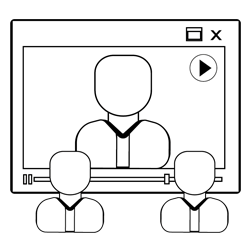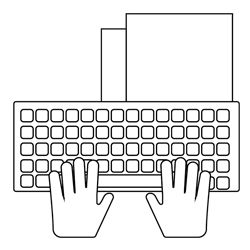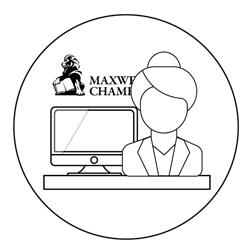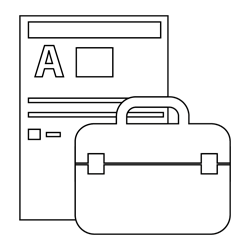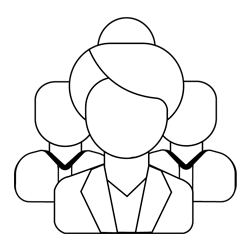Interviews
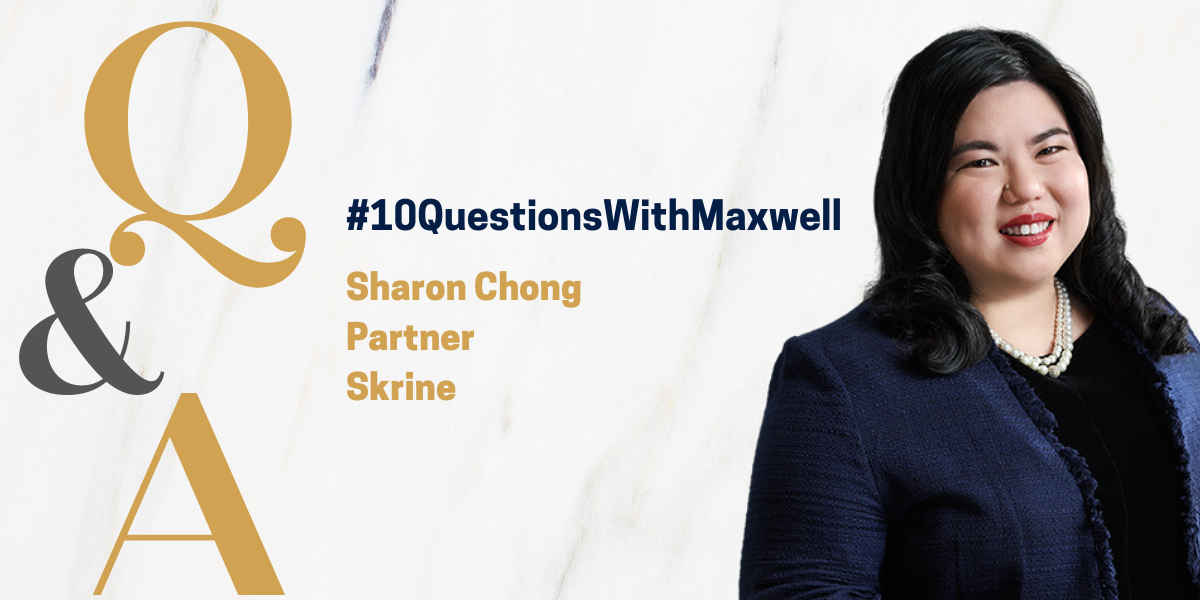
#10QuestionswithMaxwell Interview Series: Sharon Chong, Skrine
In this #10QuestionsWithMaxwell interview, we feature Sharon Chong, a Partner at Skrine in Malaysia. She is also a member of the Maxwell Steering Committee.
Sharon Chong is a dispute resolution partner and her portfolio focuses on aviation disputes, international arbitration, corporate and commercial litigation and arbitration, and insolvency and restructuring.
She acts as an advocate in a wide array of cross-border disputes and has appeared at all tiers of the Malaysian courts and in international arbitrations in Asia and Europe (including ad-hoc arbitrations and those conducted pursuant to ICC, AIAC, SIAC and TAI Rules).
Her other areas of practice include regulatory enforcement, competition disputes, and oil & gas disputes. Sharon is experienced in a broad range of corporate and commercial disputes and provides strategic input in advising corporate clients on fraud matters from the pre-dispute forensic investigation stage, to dispute resolution strategy.
Sharon is the Immediate Past President of the Malaysian Institute of Arbitrators (MIArb) and a committee member of the Young SIAC. She sits as an arbitrator and is on the panel of arbitrators of AIAC, SIAC, HKIAC and KCAB. She is a Fellow of the CIArb (UK) and the MIArb and is a member of the Steering Committee of Maxwell Chambers in Singapore. She was also appointed to the first ever Ad-hoc Arbitration Panel for the 29th SEA Games Kuala Lumpur 2017.
Sharon is a member of INSOL International and founding member and current Co-Chair of International Women’s Insolvency & Restructuring Confederation (Malaysia Network). She is also a faculty member of the Bar Council of Malaysia’s Advocacy Training Course.
In this interview, she shares the most important qualities clients look for in an arbitration counsel, proudest achievement in her career, skills and traits she would encourage in the next generation of dispute resolution lawyers, and more.
Read her full interview below:
Q: What inspired you to join the legal profession?
A: My childhood ambition was always to be either a doctor or a lawyer, although at one point in time, I had wanted to be a radio DJ! Growing up, while I enjoyed learning the science subjects in school, it became clear to me after completing pre-university that I wanted a break from mathematics, biology and chemistry; I then turned to the law. Both law and medicine require engaging one’s logical and analytical skills and one of the commonalities between a doctor and a lawyer is that they are both problem solvers. I particularly enjoy the challenge of a good puzzle or mystery, especially one that will ultimately lead to a successful outcome for my client.
Q: What do you believe are the most important qualities clients look for in an arbitration counsel?
A: As the role of lawyers evolve, clients look for counsel who possess good commercial sense and business acumen. We need to understand not only the client’s business but also the entity’s business objectives and priorities. This helps us keep pace with the client’s corporate rhythms which will accordingly lead to the effective formulation of case strategy more suited to the client’s needs.
Clients also want counsel with tenacity of spirit and drive who will continue to fight their corner and keep moving forward, even in the face of adversities or where there is setback in the case. In more complex matters, ingenuity in case strategy and arguments would also give counsel a competitive edge.
As arbitration counsel dealing with cross-border disputes, being internationally minded is a must-have. Taking the time and effort to have a comprehensive understanding of cultural issues as well as how different legal systems work in different jurisdictions will come in useful.
Q: Share with us the most interesting arbitration you have been part of.
A: My first two international arbitrations as a junior associate come to mind.
The first concerned a shareholders’ dispute with multiple overlapping court proceedings for oppression and contractual claims. There were many interesting issues in the arbitration as well in the interrelated court proceedings, among which, whether a respondent was entitled to bring a cross-claim against a co-respondent under the then ICC Rules of Arbitration 1998, the arbitrability of shareholders’ disputes and the interaction between statutory remedies and arbitration. I found it particularly interesting to see the interplay between two of my favourite areas; company law and arbitration. That was also the very first time I stepped into Maxwell Chambers. I was impressed by the state-of-the-art facilities provided, not to mention the service, professionalism and efficiency of the staff.
The second was a commodity disputes arbitration in London. That was my first international arbitration brief that I assisted as a junior associate from inception until enforcement. It was a thrilling experience for me working with clients, foreign counsel, factual and expert witnesses from across at least six different time zones. That meant that we would be taking calls at midnight until about 1 or 2 in the morning with those who were in Asia and Europe and then wake up at 6 in the morning to speak to those in North and South America. Although it was physically and mentally demanding, I had a memorable experience working on that case which ended in sweet victory.
Q: What steps do you think younger practitioners need to take in order to establish themselves in the ADR community?
A: First, build a strong foundation in legal knowledge and practice and procedure. Hone your skills, make mistakes and learn from them.
Second, build relationships with fellow practitioners. Create a network of your peers and grow in your career alongside them. A good place to seek out like-minded lawyers of the younger generation is young arbitration/ADR groups such as YSIAC, YPG, YAF and YIAG.
Third, build your presence in the community. Be involved in ADR conferences and talks – you could start by volunteering to organise events – and write articles on topics of interest and latest developments for publications and newsletters.
Q: You are the immediate past President of the Malaysian Institute of Arbitrators, also the first female President of the Institute, what lessons and experiences can you share as a female leader?
A: There are many expectations that others place on you when you attempt to push boundaries and limits. When I was entrusted with the privilege to lead the Malaysian Institute of Arbitrators, aside from being female, I was also among the youngest Presidents of the Institute, which could be considered as a daunting combination of circumstances. During my term, I engaged and worked with practitioners within and outside Malaysia, many of whom were much more senior and experienced than I was. There were times when I felt like I had to prove myself more simply because I was both female and younger, but I did not let being a younger female practitioner hold me back. Although women have made significant progress in shattering the glass ceiling and excelling and reaching the top, this mindset is commonly faced by women across industries. It is therefore important to remind ourselves to hold our own not just against the potential societal barriers or stereotypes – which are remnants of perhaps an “un-woke” society – but to also overcome these self-imposed expectations. More importantly, women in leadership positions would do well to inspire, encourage and empower other women.
We must also not be afraid or shy away from taking on challenges or to break barriers – to be the first means that we will have the opportunity to create or bring progress or change to existing dynamics. During my two-year term (2019-2021) at the Institute, I was privileged to work alongside an all-women Office Bearers Council at the Institute. My term was quite unusual – the COVID-19 pandemic struck 6 months into the term and the Council was faced with unprecedented challenges. Nonetheless, in spite of the challenges, we had an eventful term and with the support of the members and the ADR community, the Council enthusiastically adapted under the difficult conditions and achieved many milestones, among others, a series of firsts in the Institute – first virtual talk/conference, first virtual AGM and first online diploma in international arbitration course.
Q: Looking back in your career, what has been your proudest achievement?
A: It is still early to look back in my career, but I am proud that I have been able to contribute in some ways to the promotion, development and growth of arbitration and ADR from various platforms including the Malaysian Institute of Arbitrators and the Young SIAC Committee. Representing the Malaysian Institute of Arbitrators, an important stakeholder of the ADR community in Malaysia, I am in a position to participate in important discussions on the policy direction of Malaysia in relation to the law and international investments of the country.
Q: Do you have a mentor / an influential figure that you look up to throughout your career? Share with us.
A: It is difficult for me to pick just one as I have been blessed to have had so many mentors throughout my career who have inspired and taught me valuable lessons. I will always be grateful to those who have shared their wisdom and insights with me and provided me with such great opportunities that paved my career path, especially in my early years. Each and every one of these figures have played a role in shaping me into the lawyer that I am today. As I step into the role of a mentor myself, I hope that I too will be able to inspire and encourage the next generation of lawyers.
Q: What skills and traits would you encourage in the next generation of dispute resolution lawyers?
A: First, be curious and be invested in learning. The law is never static; it is constantly evolving. In the legal profession, you never stop learning. There is always something new to learn and something you don’t know yet.
Second, be patient and always persevere. One of the most important advice I received as a junior lawyer was that the legal profession should be viewed as a marathon, not a sprint.
In every lawyer’s journey, you will no doubt encounter obstacles, adversities and sometimes failures, but don’t let these discourage you from continuing your journey as each challenge and trial that you face will mould you into a better lawyer. Also, as much as we want to push ourselves towards achieving our goals, one should exercise self-care to prevent early burn-out. This will allow us to continue to have fuel to run a long and meaningful race.
Third, stay passionate about the law. Frankly, the legal practice is not a bed of roses; it demands a lot out of us. Without passion for what you are doing, the demands of the profession may overwhelm and overpower you. But if you truly love what you are doing, you will find it quite rewarding.
Q: To get to know you more on a personal level, tell us some fun facts about yourself.
A: My guilty pleasure after a long day at work is to turn on the TV – I enjoy watching Korean dramas and variety shows.
I love music, whether it is singing or playing music – putting my many years of classical piano training (since I was 3 years old) to good use. I am always up for karaoke sessions!
I would go the distance for something I truly enjoy – I have recently flown all the way to Ireland for the Game of Thrones tour and have gone to different countries to watch live standup comedy shows.
Q: Lastly, what are the 3 words or phrases that come to your mind when we mention Maxwell Chambers?
A: World class facilities, fantastic people, a place where you can network and build friendships both on professional and personal levels.





